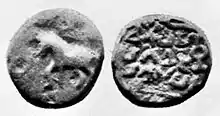
Joint coin of Hagana and Hagamasha. Obv.: Horse to left. Rev. Thunderbolt, legend Khatapāna Hagānasa Hagāmashasa. 1st century BCE.
Hagana (Ha-gā-na, Hagāna[1]) was an Indo-Scythian Northern Satrap (ruled in Mathura in the 1st century BCE, probably after 60 BCE).
Name
Hagana's name is attested on his coins in the Brahmi form Hagāna,[1] which is derived from the Saka name *Frakāna, meaning "leader, chief".[2]
Reign
In central India, the Indo-Scythians are thought to have conquered the area of Mathura over Indian kings around 60 BCE, thus founding the Northern Satraps. Some of their first satraps were Hagamasha and Hagana, who were in turn followed by Rajuvula, but according to some authors, Rajuvula may have been first.[3]
References
- 1 2 Allan, John (1936). Catalogue of the Coins of Ancient India. London: British Museum. p. 184. ISBN 978-8-170-69057-3.
- ↑ Harmatta, János (1999). "Languages and scripts in Graeco-Bactria and the Saka Kingdoms". In Harmatta, János; Puri, B. N.; Etemadi, G. F. (eds.). History of civilizations of Central Asia. Vol. 2. Delhi: Motilal Banarsidass Publishing House. p. 412. ISBN 978-8-120-81408-0.
- ↑ Indian Numismatic Studies, K. D. Bajpai Abhinav Publications, 2004, p.103-
External links
This article is issued from Wikipedia. The text is licensed under Creative Commons - Attribution - Sharealike. Additional terms may apply for the media files.